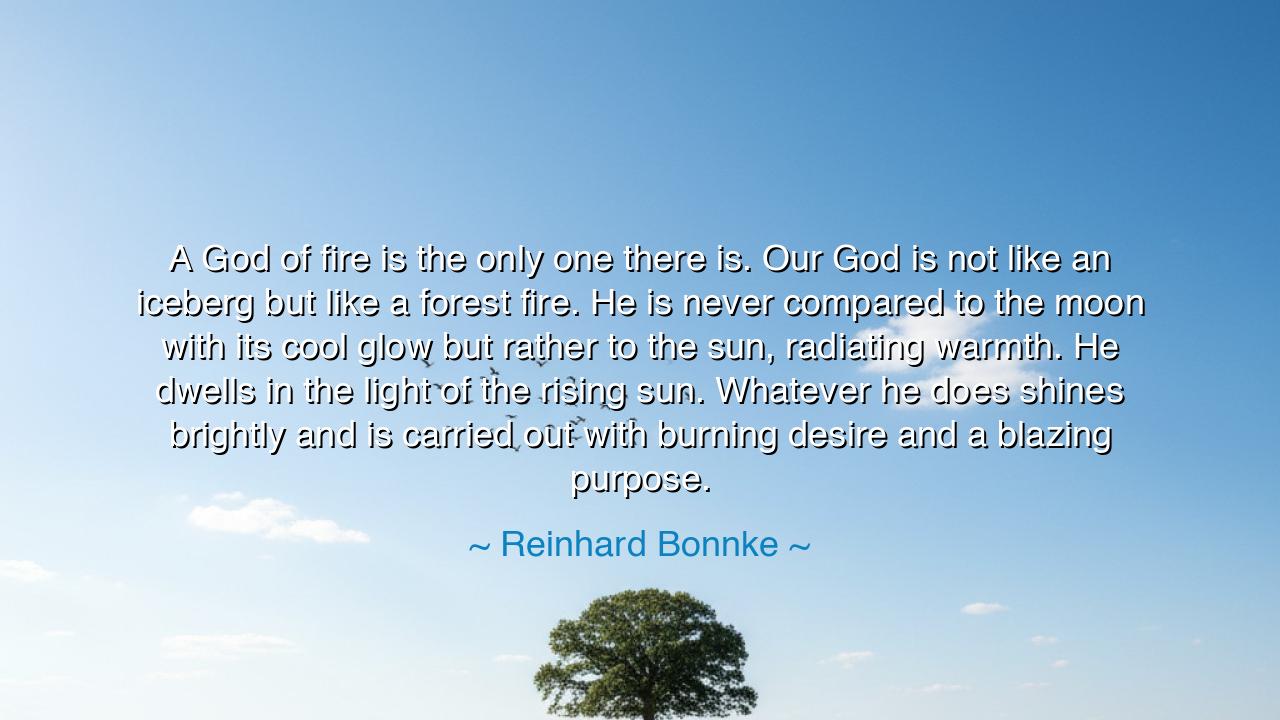
A God of fire is the only one there is. Our God is not like an
A God of fire is the only one there is. Our God is not like an iceberg but like a forest fire. He is never compared to the moon with its cool glow but rather to the sun, radiating warmth. He dwells in the light of the rising sun. Whatever he does shines brightly and is carried out with burning desire and a blazing purpose.






In the heart of every great spiritual tradition, there lies an understanding that the divine is not simply a distant, cold force, but a presence that burns with passion, purpose, and energy. Reinhard Bonnke’s words, "A God of fire is the only one there is. Our God is not like an iceberg but like a forest fire. He is never compared to the moon with its cool glow but rather to the sun, radiating warmth. He dwells in the light of the rising sun. Whatever he does shines brightly and is carried out with burning desire and a blazing purpose," encapsulate the timeless truth that the divine, in its essence, is a force of transformative heat and light, driving everything it touches toward growth, change, and purpose.
The ancients spoke of the divine in similarly fiery terms. The Greek gods, powerful and vivid, were often associated with forces of nature that carried immense energy—the god of the forge, Hephaestus, wielded fire as a tool of creation, while Zeus, the king of gods, wielded lightning as a sign of divine power and judgment. The fire that burned in their hearts and in their actions was not a passive flame, but one that shaped the world, leaving marks on all that it touched. In the same way, Bonnke’s vision of a God of fire speaks of a force that is active, alive, and never still, always pushing forward with a clear and burning mission.
Consider the ancient stories of prominent figures whose divine purpose was fueled by fire. Moses, for example, encountered God through the burning bush, a fire that neither consumed nor ceased, symbolizing the eternal presence of the divine. This fire was not merely a force of destruction but of calling and transformation—Moses was summoned by the fire to lead his people out of slavery. Just as the burning bush called Moses into action, Bonnke's words call us to see God’s presence as one of purpose, activity, and transformation, not just in a distant time but in our daily lives, urging us to burn with the same intensity for a divine cause.
Similarly, the story of Prometheus, the Titan who stole fire from the gods and gave it to humanity, represents the divine fire not just as a tool of creation but as a force that illuminates and empowers. Prometheus was willing to sacrifice everything, even his freedom, to bring this gift to humankind. This fire, like the one Bonnke describes, is not just a source of warmth but a source of transformation—it empowers people to act, to change their world, and to bring light to the darkest corners of existence. Just as Prometheus’ fire could not be extinguished, so too does God’s fire shine eternally, burning brightly with the purpose of inspiring and uplifting humanity.
Bonnke's vision of God’s fire also calls to mind the sun, a symbol of life and sustenance. The sun does not merely shine passively; it nourishes, it burns, it gives light to the day. Ancient cultures revered the sun as a symbol of the divine, as the source of all life and energy. The Egyptians built their civilization around the worship of Ra, the sun god, who represented the endless cycle of creation and renewal. In the same way, the fire of the divine is not just a fleeting flame but a source of constant renewal and recreation, pushing us forward into new adventures, discoveries, and realizations.
Bonnke’s imagery also speaks to the burning desire that fuels every great action. The sun, in its brilliance, does not shine for itself; it shines for the world. God’s fire, as described by Bonnke, is a force that exists not for its own glory, but to ignite the world around it, to bring purpose and action to the hearts of those who are touched by it. Just as the sun shines with relentless energy, God’s fire burns with the same determination, urging humanity to live with a blazing purpose, to act not out of apathy but out of a profound desire to create, to serve, and to uplift.
The lesson from Bonnke’s words is both powerful and urgent: the divine presence in our lives is not a passive, distant force, but a fire that calls us to action, to growth, and to transformation. Like the great leaders and figures of the past, we must be willing to embrace this fire, to let it burn within us, guiding us toward purposeful action. Just as Moses answered the call of the burning bush, or Prometheus brought fire to humankind, so too must we be willing to allow the divine fire to guide our actions, our hearts, and our lives.
Let us, therefore, strive to embrace this divine fire, to live with a burning desire for goodness, justice, and progress. As we go about our lives, let us not be distracted by the coldness of the world but ignite the world with the light and purpose that comes from the fire of divine inspiration. Just as the sun nourishes the earth and Prometheus gave fire to humanity, let us allow this fire to guide us, transforming the world around us with warmth, brilliance, and the unwavering commitment to a life of purpose and action.






AAdministratorAdministrator
Welcome, honored guests. Please leave a comment, we will respond soon